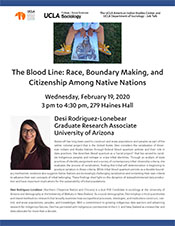[Job Talk] The Blood Line: Race, Boundary Making, and Citizenship Among Native Nations
 Wednesday, February 19, 2020
Wednesday, February 19, 2020
3pm – 4:30pm
279 Haines Hall
Presented by Desi Rodriguez-Lonebear, Graduate Research Associate, University of Arizona
Statecraft has long been used to construct and erase populations and peoples as part of the settler colonial project that is the United States. Desi considers the racialization of American Indians and Alaska Natives through federal blood-quantum policies and their role in data practices. She describes blood quantum as a "racial project" that has served to racialize Indigenous peoples and reshape or erase tribal identities. Through an analysis of state practices of identity assignment and a survey of contemporary tribal citizenship criteria, she evaluates the process of racialization, finding that tribal self-determination is beginning to produce variation in those criteria. While tribal blood quantum persists as a durable boundary mechanism, evidence also suggests Native Nations are increasingly challenging racialization and reclaiming their own criteria to advance their own concepts of tribal belonging. These findings shed light on the dynamics of state administered data production and have important implications for the sustainability of tribal populations.
Desi Rodriguez-Lonebear (Northern Cheyenne Nation and Chicana) is a dual PhD Candidate in sociology at the University of Arizona and demography at the University of Waikato in New Zealand. As a social demographer, Desi employs critical quantitative and mixed methods to research that broadly examines how sociopolitical processes, ideologies, and institutions construct, control, and erase populations, peoples, and knowledges. She is advancing three research streams: the first uses the case of Indigenous Peoples to examine how social and political processes of erasure are embedded in settler colonial structures of race, citizenship, and legitimacy; the second strand is focused on Indigenous data sovereignty and governance; and the third strand is an emerging research program on data for health and economic justice on Indian Reservations. With a commitment to growing Indigenous data warriors and advancing research for Indigenous futures, Desi has partnered with Indigenous communities in the U.S. and New Zealand as a researcher and data advocate for more than a decade. She is the Co-Founder of the U.S. Indigenous Data Sovereignty Network and serves on the Board of Directors for the National Missing and Murdered Indigenous Women and Girls Database.
The UCLA American Indian Studies Center and UCLA Department of Sociology -- Job Talk
UCLA is a tobacco-free campus. All-day parking ($13) and short-term parking (payable at pay stations) are available in Lots 2, 3 and 4 (enter the campus at Hilgard and Westholme avenues). For more information, call 310-825-7315.






